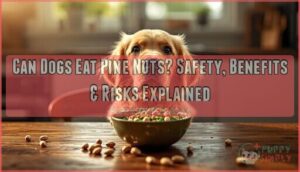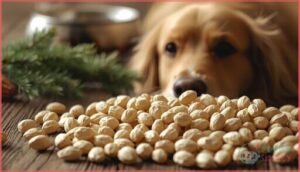This site is supported by our readers. We may earn a commission, at no cost to you, if you purchase through links.
You’ve just finished making homemade pesto when your dog gives you those irresistible puppy eyes, begging for a taste. Before you share, you wonder: can dogs eat pine nuts safely? The short answer is yes—but with serious caveats.
Unlike macadamia nuts or black walnuts, pine nuts won’t poison your pup, but their sky-high fat content makes them a risky treat. One or two won’t hurt, but a handful could trigger digestive distress or even pancreatitis. Understanding the balance between what’s safe and what’s smart matters regarding these buttery little seeds, especially if you want to keep your dog’s tail wagging without a vet visit.
Table Of Contents
- Key Takeaways
- Can Dogs Eat Pine Nuts?
- Are Pine Nuts Toxic to Dogs?
- Health Benefits of Pine Nuts for Dogs
- Risks of Feeding Pine Nuts to Dogs
- Dogs Who Should Avoid Pine Nuts
- Signs of Pine Nut Intolerance or Allergic Reaction
- How to Safely Offer Pine Nuts to Dogs
- Safer Alternatives to Pine Nuts for Dogs
- What to Do if Your Dog Eats Too Many Pine Nuts
- Frequently Asked Questions (FAQs)
- Are pine nuts toxic to dogs?
- What are the most toxic nuts for dogs?
- Who cannot eat pine nuts?
- Can dogs eat pesto and pine nuts?
- Are pine nuts harmful to dogs?
- What nuts are toxic for dogs?
- Can I give my dog pine?
- How do I know if my dog has a nut allergy?
- Are there any nuts that are safe for dogs to eat?
- What should I do if my dog eats a toxic nut?
- Conclusion
Key Takeaways
- Pine nuts are not toxic to dogs like macadamia or black walnuts, but their 40% fat content makes them risky in anything beyond tiny portions—stick to a quarter teaspoon for small dogs and one to two teaspoons max for larger breeds.
- Too many pine nuts can trigger pancreatitis, digestive upset, or weight gain, especially in dogs with kidney issues, food allergies, or sensitive stomachs who should avoid them entirely.
- If your dog eats pine nuts, watch for vomiting, diarrhea, or allergic reactions like facial swelling or breathing trouble within six hours—severe symptoms require immediate veterinary care.
- Skip the pine nuts altogether and choose safer alternatives like plain blueberries, carrots, dehydrated chicken, or commercial treats with limited ingredients and fewer than 15 calories per piece.
Can Dogs Eat Pine Nuts?
Pine nuts aren’t actually pine nuts at all—they’re edible seeds tucked inside pinecones.
You might be wondering if it’s safe to share these buttery little seeds with your dog.
The short answer is no—pistachios pose several health hazards for dogs, from digestive issues to more serious complications.
Let’s break down what pine nuts are, whether they’re safe for your pup, and how much is too much.
What Are Pine Nuts?
Pine nuts are edible seeds harvested from the cones of various pine species, not true nuts at all. You’ll recognize them by their creamy ivory color and teardrop shape.
These small kernels pack heart-healthy monounsaturated fats, protein, vitamin E, and minerals like magnesium and zinc. People use them in pesto and Mediterranean dishes, where their delicate, buttery flavor shines through after light toasting.
Are Pine Nuts Safe for Dogs?
The good news: pine nuts aren’t toxic to dogs like macadamia or black walnuts are. You can offer them without fear of poisoning.
That said, pet safety depends on moderation—these seeds contain roughly 40 percent fat, which means they’re safe in tiny amounts but risky in handfuls. Their high calorie count and digestive impact make them an occasional treat, not a daily addition to your dog’s nutrition facts.
Pine nuts are safe for dogs in small amounts, but their 40 percent fat content makes them risky in larger quantities
It’s also important to be aware of health risks associated with pine nuts, especially the potential for digestive upset or pancreatitis.
Recommended Serving Size
When you’re ready to offer pine nuts, think small—a quarter teaspoon for dogs under ten pounds, half to one teaspoon for pups between ten and twenty-five pounds, and one to two teaspoons for larger breeds.
These portions align with feeding guidelines that cap treats at five percent of daily nutrient needs. Portion control protects caloric intake and nutrient balance, helping you avoid tipping your dog’s diet toward excess fat while still unlocking safe nuts for dogs’ nutritional benefits and risks.
Are Pine Nuts Toxic to Dogs?
Good news: pine nuts won’t poison your dog the way macadamia nuts or black walnuts can. They don’t contain the toxic compounds that make some nuts downright dangerous for our four-legged friends.
That said, there are still a few things you need to know about how pine nuts stack up against other varieties and how to prepare them safely.
Toxicity Compared to Other Nuts
When you’re weighing your options, pine nuts fall on the safer end of the spectrum. They show lower heavy metal levels than pistachios and peanuts in most tested samples, and they carry less aflatoxin risk compared to cashews and almonds exposed to mold.
Macadamia nuts remain toxic to dogs, while pine nuts don’t share that danger—though moderation still matters for nutritional safety. Recent research found pine nuts contain a range of essential and toxic element concentrations, providing more insight into their safety profile.
Safe Preparation Methods
You’ll want to toast pine nuts on medium heat for two to three minutes in a dry pan—this boosts digestibility without sacrificing nutrients.
Store them in an airtight container in a cool, dry place, and refrigerate after opening to prevent rancidity. Always serve plain, without salt or oil, and break larger pieces to reduce choking risk for smaller dogs.
Health Benefits of Pine Nuts for Dogs
Pine nuts aren’t just edible for dogs—they actually pack some nutritional punch. While they’re not a must-have in your dog’s diet, these tiny seeds do offer a few health perks worth knowing about.
For instance, if you’re exploring other snacks, you might wonder can dogs eat plum skin or similar fruits before sharing.
Let’s break down what makes pine nuts potentially beneficial for your pup.
Nutritional Value
Pine nuts pack a surprising nutritional punch for such tiny seeds. While they won’t replace your dog’s regular diet, they offer real benefits when given sparingly.
- Healthy fats and plant protein – Each ounce delivers about 19 grams of unsaturated fats and 4 grams of protein, supporting energy and muscle maintenance.
- Essential minerals – Magnesium, zinc, and potassium aid nerve function and immune health.
- Vitamin content – Vitamin E acts as an antioxidant protecting your dog’s cells.
Remember, caloric density matters—at 190 calories per ounce, portion control is key for healthy snacks.
Potential Anti-Inflammatory Properties
Research shows pine nuts contain polyunsaturated fatty acids and vitamin E, acting as antioxidants that support inflammation reduction in your dog’s body.
The pinolenic acid and phytosterols work together—that’s nutrient synergy—to help modulate immune system support and healthy fatty acid balance. While they’re not miracle workers, these anti-inflammatory properties make pine nuts a thoughtful addition to your dog’s healthy snacks when you’re seeking nutrition advice.
Effects on Skin and Coat Health
Your dog’s coat is a window into overall health—and pine nuts offer coat shine boosters like vitamin E and omega fatty acids. These support skin hydration tips by maintaining moisture balance and healthy coat growth through essential nutrients.
Natural oil regulation improves, too. Just remember: nutrient balance matters, and any allergic reaction or gastrointestinal health in dogs concerns need veterinary nutrition advice before adding new foods.
Risks of Feeding Pine Nuts to Dogs
While pine nuts aren’t toxic to dogs, they’re not without their downsides.
These little seeds pack some risks that every dog owner should understand before tossing them into their pup’s bowl.
Let’s look at the main concerns you’ll want to keep in mind.
High Fat Content and Obesity
Even though they’re tiny, pine nuts pack a caloric punch—fat delivers about 9 calories per gram. If your dog munches on these regularly without adjusting their overall caloric intake, you’re tipping their energy balance toward weight gain.
High fat content foods are nutrient-dense but easy to overeat, which can disrupt obesity prevention efforts and impact your dog’s long-term canine dietary needs.
Gastrointestinal Upset
Your dog’s stomach can stage a quiet protest after a pine nut snack. Digestive issues like vomiting, loose stools, or gas may appear, especially if your pup has food sensitivities or a history of stomach problems.
The high fat content triggers gastrointestinal upset in some dogs, while others with nut allergies might react even more strongly, compromising gut health and overall food safety for dogs.
Choking and Blockage Hazards
Beyond stomach upset, pine nuts can pose airway obstruction risks. Their small, smooth shape means choking hazards are real, especially for enthusiastic eaters.
To reduce blockage prevention concerns:
- Offer tiny pieces your dog can chew easily
- Supervise meals closely
- Keep your pup calm while eating
- Remove pine nuts immediately if coughing starts
Nut size matters when preventing dangerous incidents.
Dogs Who Should Avoid Pine Nuts
While pine nuts aren’t toxic, they’re not right for every dog. Some pups have health conditions that make these little seeds risky, even in small amounts.
Let’s look at which dogs should skip pine nuts altogether.
Dogs With Kidney or Urinary Issues
Your dog’s fragile renal system can’t afford extra stress from high-phosphorus foods like pine nuts. If your pup has canine kidney issues, kidney failure, or urinary tract infections, effective phosphorus management becomes critical for renal diet planning.
Pine nuts—though not toxic nuts for dogs—still strain compromised kidneys. Prioritize kidney stone prevention and pet health by skipping these seeds entirely, focusing instead on dog health and nutrition designed to protect kidney function.
Dogs With Food Allergies
Just like kidney problems, food allergies in dogs demand careful attention to dietary needs. If your pup has canine allergies and intolerances or known food sensitivities, pine nuts could trigger an allergic reaction—think gagging, diarrhea, or skin flare-ups.
Hypoallergenic diets and allergy testing help identify problem ingredients. Before introducing pine nuts, discuss your dog’s canine nutrition plan with your vet to avoid unnecessary risks.
Puppies and Small Breeds
Young puppies and tiny pups face special challenges regarding pine nuts. Their developing systems aren’t equipped to handle high-fat snacks, and those little airways make choking a real concern.
Consider these puppy nutrition and small breed care factors:
- Puppies under 12 weeks need stable eating routines first
- Whole pine nuts pose choking hazards for small mouths
- High fat content disrupts canine development
- Gastrointestinal upset hits tiny bodies harder
- Breed specific needs vary—consult your vet
Skip the pine nuts until your pup’s grown and settled into their canine nutrition plan. Pet safety tips like these protect vulnerable dogs from toxic foods for dogs and unnecessary digestive drama.
Signs of Pine Nut Intolerance or Allergic Reaction
Even though pine nuts aren’t toxic, your dog’s body might not agree with them.
Some dogs experience digestive upset, while others show signs of a true allergic reaction. Here’s what to watch for if you’ve recently given your dog pine nuts.
Gastrointestinal Symptoms
If your dog’s digestive system starts acting up after eating pine nuts, you’ll want to watch closely. Gastrointestinal upset usually shows up as diarrhea, vomiting, or nausea within a few hours.
You might notice stomach problems like abdominal pain, bloating, or irregular bowel movements. These digestive issues signal that your dog’s gut health is struggling to handle the high fat content.
Allergic Reaction Warning Signs
True allergic reactions differ from digestive upset and can escalate quickly. If your dog develops hives, facial swelling, or difficulty breathing after eating pine nuts, you’re witnessing signs of canine allergies and intolerances that demand immediate attention.
Watch for these allergic reaction warning signs:
- Skin reactions like raised welts or sudden swelling around the eyes and muzzle
- Respiratory issues including wheezing, coughing, or labored breathing
- Severe gastrointestinal alerts such as repeated vomiting with other symptoms
- Anaphylaxis symptoms like collapse, bluish gums, or loss of consciousness
These dog health risks from nut allergy can mirror responses to toxic nuts and may progress to allergic shock.
When to Seek Veterinary Help
Timing matters when your dog shows distress after eating pine nuts. If you notice seizures, severe breathing trouble, or collapse, head to urgent care immediately—these emergency signs require fast veterinary care.
Contact poison control or your vet if symptoms worsen beyond mild upset. Don’t wait with toxic foods concerns or allergic reaction symptoms like facial swelling. Early veterinary guidance prevents serious dog health risks.
How to Safely Offer Pine Nuts to Dogs
If you’ve decided pine nuts might work for your dog, the next step is making sure you offer them the right way.
Portion size, preparation, and timing all matter in terms of keeping treats safe and beneficial.
Here’s what you need to know before tossing your pup a few pine nuts.
Serving Tips and Portion Control
Think of pine nuts as a garnish, not a meal. For a medium-sized dog, start with just two or three pine nuts once or twice a week.
Use measuring techniques to track portion sizes accurately, and integrate them into feeding schedules as occasional healthy snacking rather than daily additions. This approach promotes nutrient balance and healthy dog treats without overwhelming your dog’s diet.
Raw Vs. Roasted Pine Nuts
Your dog won’t notice much difference, but you should. Raw pine nuts retain slightly more vitamin E and antioxidants, while roasting techniques bring out richer flavor profiles and crunch.
Both fit into canine diet and wellness plans, though raw pine nuts require careful storage methods in the refrigerator to prevent rancidity. The nutrition comparison? Minimal, so choose based on shelf life and your dog’s preference.
Consulting Your Veterinarian
Before you add pine nuts to your dog’s routine, schedule a vet visit. Your vet will review your pet’s medical history, discuss diagnostic test options if needed, and create a treatment plan discussion customized to your dog’s health.
This veterinary advice and guidance ensures the addition fits into your dog’s nutrition and health goals, with clear follow-up care instructions for monitoring reactions.
Safer Alternatives to Pine Nuts for Dogs
If you’re looking for safer options that won’t bring the same risks as pine nuts, you’re in luck.
There are plenty of wholesome alternatives that offer nutrition without the worry. Let’s look at some wholesome alternatives that your dog will love just as much.
Dog-Friendly Fruits and Vegetables
Instead of pine nuts, you can reward your dog with fresh berries like blueberries or sliced strawberries—both deliver antioxidants without the fat.
Canine carrots offer satisfying crunch and fiber, while pet safe greens such as green beans support dog nutrition and health.
Always introduce new veggie rewards gradually to watch for fruit allergies, and confirm each choice aligns with food safety and canine diet and wellness goals under your vet’s guidance.
Healthy Commercial Dog Treats
When you’re reaching for commercial dog treats, look for grain free options that put real meat first on the label.
Healthy snacks for dogs should feature limited ingredients and fewer than 15 kilocalories per piece for calorie control.
Additive free formulas without artificial colors or preservatives make ideal training rewards, and wholesome pet treats with natural pet food and treats credentials beat pine nuts every time.
Wholesome Meat-Based Snacks
Meat snack options like plain jerky or dehydrated chicken bites deliver high protein without the risks pine nuts carry. You’ll find healthy treats made from lean beef, turkey, or fish offer better pet nutrition and dog food safety.
These meat based diets align with your dog’s natural needs far better than seeds. Just check labels for toxic seasonings and keep portions under 10% of daily calories.
What to Do if Your Dog Eats Too Many Pine Nuts
If your dog got into the pine nuts and ate more than a few, don’t panic—but don’t ignore it either.
The good news is that pine nuts aren’t toxic, but too many can still cause digestive upset or other issues. Here’s what you need to watch for and when it’s time to call your vet.
Monitoring for Symptoms
Think of your dog’s body like a smoke detector—early warning signs matter. After your pup eats too many pine nuts, symptom tracking becomes your best tool.
Watch for gastrointestinal health issues like vomiting or diarrhea within six hours. Note any allergies and sensitivities—itching, swelling, or respiratory changes signal a reaction.
Track canine response patterns daily, recording appetite shifts and energy dips to catch toxic risks before they escalate.
Emergency Steps and Veterinary Care
If your dog shows severe symptoms—choking, unresponsive behavior, or heavy vomiting—call your veterinarian or emergency animal hospital immediately. Urgent care can prevent toxic reactions from escalating.
For mild gastrointestinal upset, monitor closely and reach out for veterinary advice. Pet first aid includes keeping your dog calm and limiting food until you’ve consulted a vet. Emergency response matters when toxicity treatment becomes necessary for your dog’s safety and wellness.
Preventing Future Incidents
Once you’ve handled the emergency response, take preventive measures to keep your dog safe long-term. Incident reporting starts at home—note what happened and when so you can share details during your next veterinary visit.
- Store pine nuts and other risky foods in secure, dog-proof containers
- Conduct a quick risk assessment of accessible counters and pantry shelves
- Reinforce safety protocols by teaching your dog “leave it” commands
- Schedule regular check-ins with your vet for pet care and safety guidance
Frequently Asked Questions (FAQs)
Are pine nuts toxic to dogs?
No, pine nuts aren’t toxic to dogs when plain and unsalted. Unlike macadamia nuts or black walnuts, they don’t carry canine-specific toxins.
Still, their high fat content demands caution for your pet’s wellness.
What are the most toxic nuts for dogs?
Macadamia nuts top the list of toxic nuts—causing weakness and tremors within 12 hours.
Black walnuts contain juglone that irritates your dog’s gut, while pecans can trigger pancreatitis from high fat content.
Who cannot eat pine nuts?
About 1-2% of people experience tree nut allergies—and that includes cross-reactivity with pine nuts.
If your dog has kidney issues, food allergies, or phosphorus sensitivity, skip pine nuts entirely to avoid serious complications.
Can dogs eat pesto and pine nuts?
No, you shouldn’t feed pesto toxicity to your dog. Traditional pesto contains garlic and onions, both toxic to dogs, plus high fat and salt levels that risk digestive upset.
Are pine nuts harmful to dogs?
No, they aren’t toxic, but high fat content poses real risks for your dog. Overconsumption can trigger pancreatitis, digestive upset, or weight gain—especially in dogs prone to these conditions.
What nuts are toxic for dogs?
Several nuts pose serious health risks to your dog. Macadamia risks include tremors and weakness, while walnut toxicity causes neurological symptoms.
Pecan dangers, almond hazards, and cashew precautions involve digestive upset and potential blockages.
Can I give my dog pine?
Yes, but skip the whole pine cone. Pine nuts themselves—the seeds—are safe in small amounts for healthy dogs.
Just make sure you’re offering plain nuts, not anything from the tree itself.
How do I know if my dog has a nut allergy?
Watch for vomiting, diarrhea, or excessive paw licking after your dog eats nuts. Facial swelling, hives, or breathing trouble signals a serious allergic reaction requiring emergency veterinary care immediately.
Are there any nuts that are safe for dogs to eat?
Plain, unroasted peanuts and cashews can be safe snacking options in tiny amounts if your dog tolerates them.
However, most tree nuts pose choking risks and can trigger canine allergies and intolerances, so proceed cautiously.
What should I do if my dog eats a toxic nut?
If your dog swallows a toxic nut like macadamia or black walnut, contact your vet or the Animal Poison Control Center immediately.
Watch for dog toxicity signs—weakness, vomiting, or tremors need emergency vet care.
Conclusion
Like that curious cat with nine lives, your dog’s curiosity won’t be the end of them—but caution keeps everyone safer. So can dogs eat pine nuts? Technically yes, but moderation is everything.
A stray nut won’t spell disaster, yet regularly feeding these fatty treats invites trouble you don’t need. Stick with dog-approved snacks instead, and save the pesto for yourself. Your pup’s health deserves choices made with clarity, not crossed fingers.

















